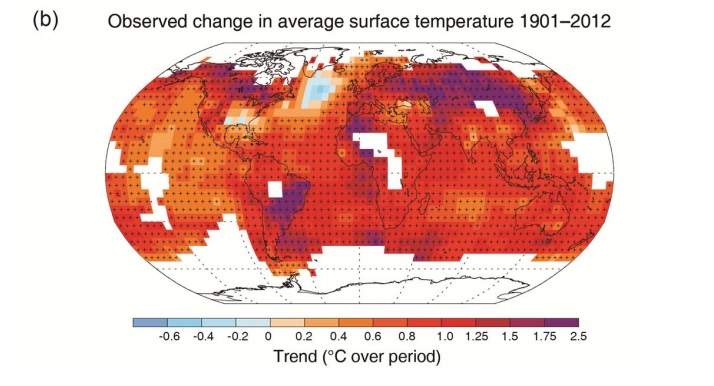by: Courtney Remacle
The Intergovernmental Panel on Climate Change stated in their first report in six years that
Human influence has been detected in warming of the atmosphere and the ocean, in changes in the global water cycle, in reductions in snow and ice, in global mean sea level rise, and in changes in some climate extremes…. It is extremely likely that human influence has been the dominant cause of the observed warming since the mid-20th century.[i]
The report also states, among other things, that “The rate of sea level rise since the mid-19th century has been larger than the mean rate during the previous two millennia” and “warming of the climate system is unequivocal, and since the 1950s, many of the observed changes are unprecedented over decades to millennia.”[ii]
The IPCC has stated in this report that they are 95% certain that humans are the primary cause of warming increases since the 1950s. One would hope that this would shift the political debate to what can be done about climate change rather than whether or not it’s real, but in a country with a political climate as volatile as its ecological one, it’s hard to say what the immediate impact of this finding will be.
Closer to home, warming will continue and likely increase in all projections made by the IPCC, meaning we will all experience more extremely hot days and fewer extremely cold days. It was also projected that we will hit or surpass 1 trillion tons of carbon dioxide emitted into the atmosphere by 2040, unless drastic measures are undertaken to reduce our global emissions. 1 trillion tons is the maximum amount of carbon dioxide that can be released while keeping global warming under 3.6 degrees Farenheit. (It is widely agreed upon that 3.6 degrees of warming would cause catastrophic change to the climate).
The IPCC, chaired by Rajendra Pachauri, is a scientific committee formed by the United Nations in 1988 to review climate change science to provide information to policy makers. The IPCC does not produce its own scientific research—rather, it reviews published climate science and compiles reports on these previously published findings to aid policy makers and the public in their understanding of and access to climate science research.
The IPCC releases comprehensive reports every five to six years. This report, AR5, is being released in four segments. The release of these segments began on September 27th and will continue over the next year or so. The Summary for Policymakers of Working Group I of the IPCC (focused on the physical science of climate change) can be read here. More information about the IPCC and AR5 can be found here and here.
[i] Intergovernmental Panel on Climate Change. 2013. Climate Change 2013: The Physical Science Basis—Summary for Policymakers.
http://www.climatechange2013.org/images/uploads/WGIAR5SPM_Approved27Sep2013.pdf
[ii] Ibid.

